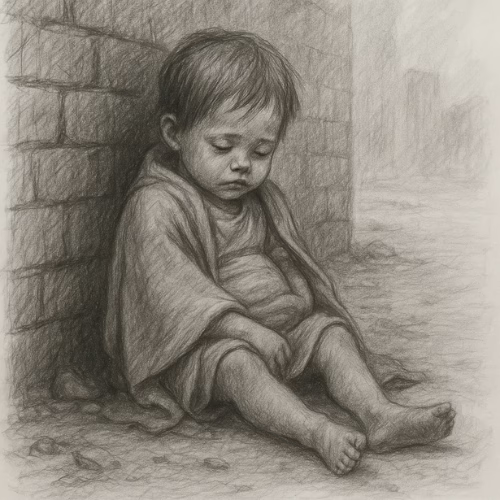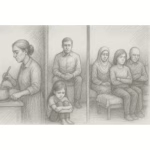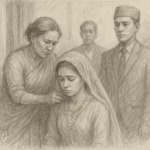She was fifteen when she found out she was pregnant. The father was a boy from her school, a boy who vanished as soon as the rumors started. She carried the secret in her belly for months, tying her school uniform tighter, swallowing her fear every time her mother looked at her. At night she lay awake, pressing her hands to her stomach, feeling something that was not yet a child but already a weight she couldn’t escape.
When she gave birth, alone in a room behind a market stall, she barely looked at the baby. She wrapped him in an old blanket, handed him to a woman who promised to find a “better home.” She never asked where he would go. She didn’t want to know. In her village, there was no room for a girl who couldn’t say who the father was, no forgiveness for a child born without a name. She told herself it was better this way, that she was giving him a chance she could never offer. But in the dark, her hands still remembered the shape of his tiny body, the softness of his breath before she turned away.
In another part of the city, a couple in their forties was paying thousands of dollars to a fertility clinic. Their house was filled with baby clothes that had never been worn, empty cribs waiting like open mouths. They spoke in hushed tones about “implantation success rates” and “embryo viability,” their faces lit by the glow of ultrasound images. They didn’t know about the girl in the market stall, or the baby wrapped in a blanket and given away like a secret. They didn’t want to know.
In Europe, thousands of embryos lie frozen in steel tanks, their futures decided by numbers and signatures. Some are chosen, some are left behind. In one clinic in Belgium, a technician once said, “We have more embryos than we know what to do with.” In the same breath, a woman sits in her car, sobbing over another failed IVF cycle. The world is full of children who will never be born, and children who are born but never wanted.
There are boys who grow up without fathers, who hear their mothers whispering about “mistakes” and “accidents.” Girls who learn too early that their existence is a burden. A boy in Lagos who carries his father’s anger in the set of his jaw. A girl in Hanoi who sees her mother’s shame in every mirror. They grow up fast, too fast, learning to hide their hunger and their longing behind polite smiles. They are the children who never ask for more because they know there is nothing more to ask for.
Some of them run away. Some of them become the same parents they once feared. Others build lives out of scraps—jobs in factories, rented rooms, borrowed dreams. But there is always a piece missing, a silence that follows them into every room. They learn to live with it, to patch the hole with work or alcohol or the quiet hope that they will be the last in their family to feel this kind of loneliness.
And what of the mothers who walked away? They carry the weight in their bones, in the dreams that wake them in the middle of the night. They marry men they do not love, they raise children who will never know the brother or sister who was given away. Some never speak of it again. Others light incense for a child they never named, hoping that in some other life, they might find forgiveness.
The world calls them careless. The world calls them selfish. But the world does not hear the way their hearts break each time they see a child’s face in a crowded street, or the way they reach out, just for a moment, to hold a stranger’s baby before remembering they no longer have the right.
In this world, some children are born out of love, others out of chance, and others still out of desperation. But all of them are here, breathing, needing, aching for something that feels like home.



